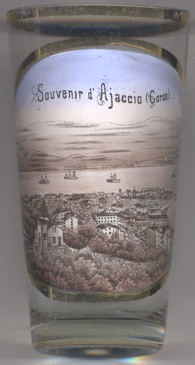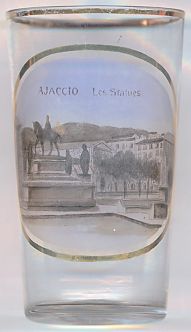

|
| FRANCE | FRANCE |
| région: Corse | Corsica |
| département: 2A, Corse-du-Sud |
Ajaccio (in Corsican Aiacciu or Aghjacciu) is situated ais located on the west coast of the island of Corsica, 210 nautical miles southeast of Marseille. It occupies a sheltered position at the foot of wooded hills on the northern shore of the Gulf of Ajaccio. The harbour lies to the east of the town and is protected on the south by a peninsula. Ajaccio is the capital of the territorial collectivity of Corsica and the préfécture of the département Corse-du-Sud. The city has a population of about 52,900 (1999).
 The present town of Ajaccio lies about two miles to the south of its original site, from which it was transferred by the Genoese in 1492.
Occupied from 1553 to 1559 by the French, it again fell to the Genoese after the Treaty of Cateau-Cambrésis in the later year.
In 1768 Corsica finally passed to France and Ajaccio subsequently became the capital of the
département Liamone, in 1811 of the département Corse (Corsica).
The Corsican National Assembly (Assemblée nationale corse) is based here since its establishment in 1982 in the course of the
regionalisation of France under President François Mitterrand.
The present town of Ajaccio lies about two miles to the south of its original site, from which it was transferred by the Genoese in 1492.
Occupied from 1553 to 1559 by the French, it again fell to the Genoese after the Treaty of Cateau-Cambrésis in the later year.
In 1768 Corsica finally passed to France and Ajaccio subsequently became the capital of the
département Liamone, in 1811 of the département Corse (Corsica).
The Corsican National Assembly (Assemblée nationale corse) is based here since its establishment in 1982 in the course of the
regionalisation of France under President François Mitterrand.
Napoléon Bonaparte was born in Ajaccio on the 15th of August, 1769. His birth name was Napoleone di Bonaparte, but he changed his name to the French form in 1796. Napoleon I was a general during the French Revolution, the ruler of France as First Consul (Premier Consul) of the French Republic from 11 November 1799 to 18 May 1804, Emperor of the French (Empereur des Français) from 18 May 1804 to 6 April 1814, and was briefly restored as Emperor from 20 March to 22 June 1815. He was also King of Italy, Mediator of the Swiss Confederation and Protector of the Confederation of the Rhine.
He first rose to prominence as a general of the French Revolution, leading several successful campaigns against the First Coalition and the Second Coalition. At the turn of the 19th century, over the course of little more than a decade, the armies of France under his command fought almost every European power and acquired control of most of continental Europe by conquest or alliance. He appointed several members of his family and close friends as monarchs of countries he conquered and as important government figures. The disastrous invasion of Russia in 1812 marked a turning point. Following the Russian campaign and the defeat at Leipzig in October 1813, the Sixth Coalition invaded France, forcing Napoleon to abdicate in April 1814. He was exiled to the island of Elba. Shortly afterward, he staged a comeback known as the Hundred Days (les Cent Jours), but was defeated at Waterloo on 18 June 1815. Napoleon spent the remaining six years of his life on the island of St. Helena in the Atlantic Ocean under British supervision. He died on the 5th of May, 1821.
 The
The  monument for Napoleon and his brothers [left]
was erected on Place du diamant (now Place du général de Gaulle) during the Second Empire. The ensemble comprises a statue of Napoleon in Roman costume on horse-back surrounded
by standing statues of Joseph, Lucien, Louis and Jérôme, all set on pink granite pedestals. The monument as a whole was designed by the architect
Eugène Emmanuel Viollet-le-Duc but the individual bronze statues are the work of Antoine-Louis Barye (statue of Napoléon), Jean-Claude Petit (statues of Joseph and Louis),
Emile Thomas (statue of Lucien) and Jean-Baptiste Maillet (statue of Jérôme).
A commemorative plaque bears the following inscription (here translated): To Napoleon I and his brothers. Corsica remembers you with gratitude.
During the reign of Napoleon III, this monument was erected by Napoléon-Jérôme with the assistance of voluntary subscriptions, and it was
unveiled on 15 May 1865'. On that occasion, the Prince Jérôme Napoléon (son of Jérôme Bonaparte and nephew of Napoléon I)
delivered a stinging speech criticising the Emperor's policies.
In the ensuing scandal the Prince Jérôme Napoléon was forced to resign from his post as Vice-President of the Privy Council as well as from presidency
of the commission responsible for organising the Paris Universal Exhibition of 1867.
monument for Napoleon and his brothers [left]
was erected on Place du diamant (now Place du général de Gaulle) during the Second Empire. The ensemble comprises a statue of Napoleon in Roman costume on horse-back surrounded
by standing statues of Joseph, Lucien, Louis and Jérôme, all set on pink granite pedestals. The monument as a whole was designed by the architect
Eugène Emmanuel Viollet-le-Duc but the individual bronze statues are the work of Antoine-Louis Barye (statue of Napoléon), Jean-Claude Petit (statues of Joseph and Louis),
Emile Thomas (statue of Lucien) and Jean-Baptiste Maillet (statue of Jérôme).
A commemorative plaque bears the following inscription (here translated): To Napoleon I and his brothers. Corsica remembers you with gratitude.
During the reign of Napoleon III, this monument was erected by Napoléon-Jérôme with the assistance of voluntary subscriptions, and it was
unveiled on 15 May 1865'. On that occasion, the Prince Jérôme Napoléon (son of Jérôme Bonaparte and nephew of Napoléon I)
delivered a stinging speech criticising the Emperor's policies.
In the ensuing scandal the Prince Jérôme Napoléon was forced to resign from his post as Vice-President of the Privy Council as well as from presidency
of the commission responsible for organising the Paris Universal Exhibition of 1867.
[http://en.wikipedia.org/wiki/Ajaccio, http://en.wikipedia.org/wiki/Napoleon_I_of_France;
http://www.napoleon.org/en/magazine/itineraries/course/corse_parcourstree_English.asp?id=448687]
![[scale]](lineal.jpg)